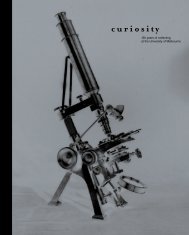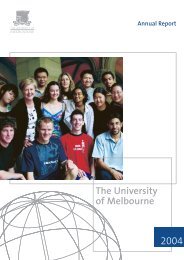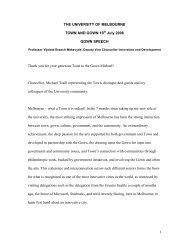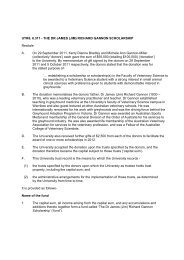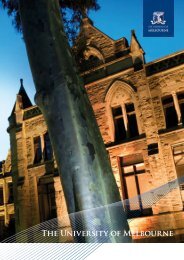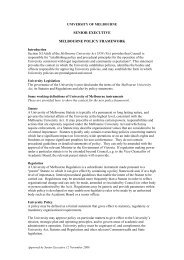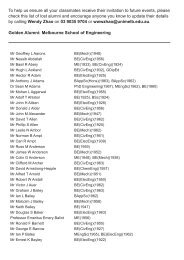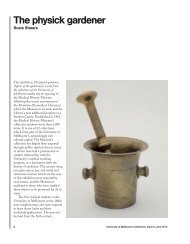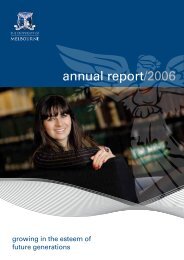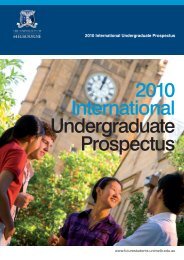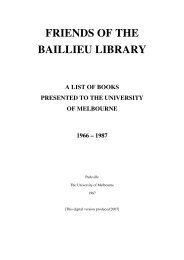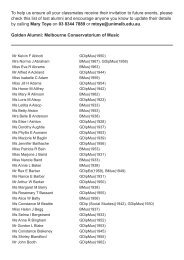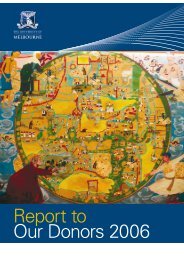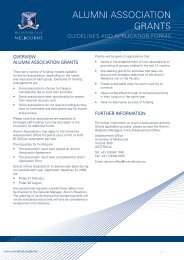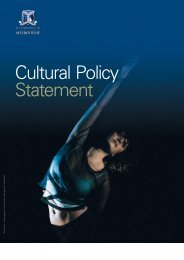2007 Annual report (PDF 8.1 Mb) - University of Melbourne
2007 Annual report (PDF 8.1 Mb) - University of Melbourne
2007 Annual report (PDF 8.1 Mb) - University of Melbourne
You also want an ePaper? Increase the reach of your titles
YUMPU automatically turns print PDFs into web optimized ePapers that Google loves.
LEARNING &<br />
teACHING<br />
> Review the success <strong>of</strong> <strong>of</strong>fering a<br />
restricted number <strong>of</strong> Access Scholarships<br />
in December 2006 to determine if all<br />
Access Scholarships can be awarded in<br />
December <strong>2007</strong> (for the undergraduate<br />
cohort commencing in 2008)<br />
Achievements<br />
<strong>2007</strong> was the third year <strong>of</strong> Access<br />
<strong>Melbourne</strong>. Through the Access <strong>Melbourne</strong><br />
Scheme, the <strong>University</strong> aims to admit 20<br />
per cent <strong>of</strong> its undergraduate CSP intake<br />
from applicants who have experienced<br />
disadvantage during their secondary<br />
schooling. Of those admitted, one in five<br />
is awarded a scholarship. In <strong>2007</strong>, Access<br />
<strong>Melbourne</strong> enrolments totalled 1077,<br />
representing 20.1 per cent <strong>of</strong> the CSP<br />
intake. Two hundred and one <strong>of</strong> these were<br />
awarded Access Scholarships.<br />
The Access <strong>Melbourne</strong> program for<br />
undergraduates will be extended to<br />
graduate students in 2008 with a minimum<br />
20 per cent <strong>of</strong> the CSPs in pr<strong>of</strong>essional<br />
degrees to be allocated to Graduate Access<br />
<strong>Melbourne</strong> applicants. Up to 100 one-<strong>of</strong>f<br />
bursaries <strong>of</strong> $5000 will also be awarded to<br />
Access <strong>Melbourne</strong> applicants enrolling in<br />
graduate programs to assist in meeting the<br />
costs associated with graduate study.<br />
In 2006 a pilot program <strong>of</strong>fering a<br />
restricted number <strong>of</strong> <strong>Melbourne</strong> Access<br />
Scholarships was instigated to determine<br />
whether it would be feasible to award all<br />
Access Scholarships in December. The<br />
Undergraduate Scholarships Committee’s<br />
review <strong>of</strong> the pilot <strong>of</strong>fering found that the<br />
early <strong>of</strong>fers were only partly successful<br />
due to selection differences between<br />
universities and workload issues for the<br />
Scholarships Office.<br />
Indigenous students<br />
Strategic Priority<br />
> Ensure that the <strong>University</strong> attains its<br />
target to recruit 30 Indigenous Australian<br />
students in <strong>2007</strong><br />
Achievements<br />
The recruitment, retention, experience<br />
and success <strong>of</strong> Indigenous Australian<br />
students remains a priority for <strong>Melbourne</strong>.<br />
The <strong>University</strong>’s Centre for Indigenous<br />
Education (CIE) is the key focus <strong>of</strong> the<br />
<strong>University</strong>’s strategy to increase Indigenous<br />
student participation. The Centre has<br />
developed strong collaborative relationships<br />
with Aboriginal communities as well as<br />
Indigenous academic staff and units within<br />
the <strong>University</strong>. The CIE has gradually<br />
strengthened links with Trinity Residential<br />
College, with the number <strong>of</strong> Indigenous<br />
students in residency increasing from two in<br />
2001 to 10 in <strong>2007</strong>.<br />
The <strong>University</strong> attained its target to recruit<br />
30 Indigenous students in <strong>2007</strong> with<br />
a total <strong>of</strong> 34 students from Aboriginal<br />
or Torres Strait Islander backgrounds<br />
commencing undergraduate studies. The<br />
<strong>University</strong> recognises that there is room for<br />
improvement in this important area.<br />
Victorian universities are developing a<br />
coordinated approach to Indigenous student<br />
recruitment, and it is envisaged that a more<br />
synchronised recruitment scheme will boost<br />
enrolments across the sector.<br />
Students with Disabilities<br />
Strategic Priority<br />
> Report to PBC on implementation <strong>of</strong><br />
2004-07 Disability Action Plan<br />
Achievements<br />
The Disability Action Plan 2008-11 endorsed<br />
by the Academic Board in June <strong>2007</strong> will<br />
build on the successes <strong>of</strong> the 2004-07<br />
Disability Action Plan in achieving significant<br />
improvements in the participation <strong>of</strong><br />
students with disabilities. Based on the<br />
DEST-defined disability groups: Hearing,<br />
Vision, Learning, Mobility and Medical<br />
(Mental Health Conditions forming a<br />
subgroup <strong>of</strong> the Medical Category), the<br />
new Plan tackles key issues impacting on<br />
these groups, identified from feedback<br />
mechanisms built into the earlier plan. One<br />
<strong>of</strong> the 2004-<strong>2007</strong> Plan’s most important<br />
outcomes was the development <strong>of</strong><br />
guidelines to cater for students undertaking<br />
subjects with practicum or independent<br />
research activities as an integral component.<br />
During <strong>2007</strong> facilities for deaf students were<br />
significantly improved with the extension<br />
<strong>of</strong> the Live Remote Captioning (LRC)<br />
service across the <strong>University</strong>. LRC works by<br />
capturing audio information from a teaching<br />
environment and converting it to text by a<br />
stenocaptioner. The text is then streamed to<br />
a computer using the internet. The process<br />
happens in real time with minimal delay and<br />
the words appear on screen with 98 per<br />
cent accuracy.<br />
Identify and Implement<br />
initiatives to enhance the<br />
<strong>Melbourne</strong> Experience<br />
Strategic Priorities<br />
> Develop a strategy on opportunities for<br />
student engagement through residential<br />
colleges<br />
> Consider, in light <strong>of</strong> CSHE<br />
recommendations, the methodology <strong>of</strong> a<br />
<strong>Melbourne</strong> Experience survey measuring<br />
attitudes on the cohort experience to be<br />
administered by the end <strong>of</strong> students’ first<br />
year<br />
> Implement the <strong>Melbourne</strong> Experience<br />
Committee recommendations on<br />
transition activities including orientation<br />
and capstone programs<br />
> Further define and measure the concept<br />
<strong>of</strong> ‘a cohort experience’ and develop<br />
cohort experience initiatives<br />
Achievements<br />
The <strong>Melbourne</strong> Experience is at the heart<br />
<strong>of</strong> all <strong>Melbourne</strong> degrees. The <strong>University</strong><br />
aims to:<br />
> provide students with a variety <strong>of</strong><br />
opportunities for becoming global citizens<br />
through increased opportunities to study<br />
overseas;<br />
> encourage students to develop friendship<br />
networks through group work and peer<br />
mentoring programs;<br />
> provide exciting and innovative e-<br />
experiences, access to learning centres,<br />
and support for e-learning communities;<br />
> strengthen students’ links outside the<br />
<strong>University</strong>, through internships, on<br />
location subject delivery and volunteering.<br />
Table 5: Indigenous students Enrolments and Completions<br />
2000 2001 2002 2003 2004 2005 2006 <strong>2007</strong><br />
Enrolments 166 222 231 239 276 245 236 192<br />
Completions 36 43 65 63 67 55 57 59 (est)<br />
The <strong>University</strong> <strong>of</strong> <strong>Melbourne</strong> <strong>Annual</strong> Report <strong>2007</strong> 37



